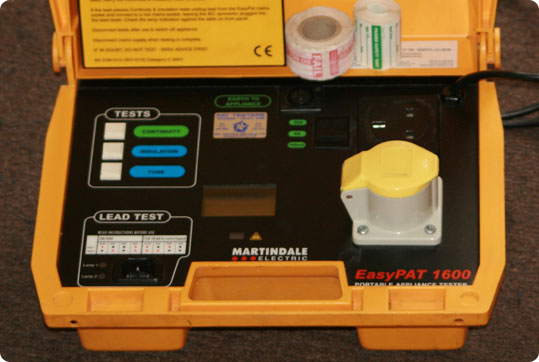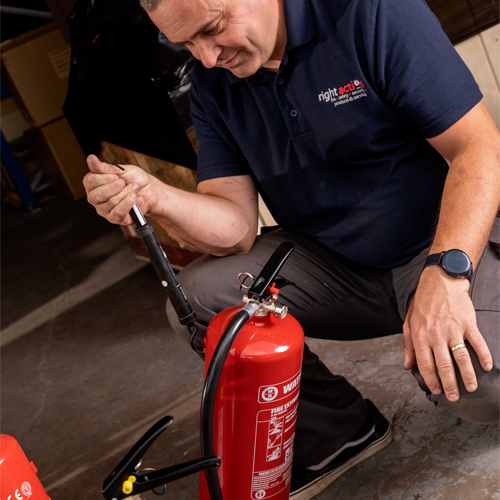Ten Tips For PAT's Ongoing Support And Advice in Nottingham
In the UK Continuous assistance and guidance is what makes a PAT test service different from a partner in health and safety strategic. While the initial testing event addresses immediate compliance needs, the dynamic nature of workplaces–with constantly changing equipment, staff, and environments–requires continuous guidance to maintain safety standards between formal testing cycles. Electricity at Work Regulations (1989) require that dutyholders maintain electrical equipment. The ability to access expert advice in between scheduled tests is therefore essential to demonstrate the utmost diligence. The ongoing support is superior and transforms PAT testing into an integrated safety program. It provides value through risk assessment update and alerts to regulatory changes in addition to practical solution-finding. This relationship of advisory ensures that electrical security is a living process within an organization rather than a check-box activity.
1. Account Management Dedicated and Single Point Contact
Professional PAT providers provide an account manager to manage any questions that arise after taking the test. This person is responsible to handle administrative and technical issues. The account manager is knowledgeable of all your details including account history, as well as your asset register. They can also offer guidance without having you to continuously explain the your situation. Account managers should check the service on a regular basis (annually or two times a year) to identify and address any concerns, discuss performance and track evolving needs.
2. Telephone and Email Advisory Services for technical Queries in Nottingham
Clients require access to technical assistance during the testing phases. This includes situations like assessing a new purchase, handling minor damages or following the directions of a manufacturer. Providers should provide channels that are clearly marketed (dedicated line/email), and with response times guaranteed (e.g. – within 2 hours). This allows duty-holders to make decisions about safety in real time, and prevent the use potentially hazardous equipment in the meantime.
3. The Regulatory Update Service as well as Compliance Change Alerts in Nottingham
The regulatory landscape evolves with HSE communications, amendments to the IET Code of Practice, and court decisions that establish new precedents. A comprehensive support program for ongoing compliance includes a well-organized regulatory update service that alerts clients to relevant changes affecting their PAT testing regimen. They could receive newsletters and bulletins about important developments or tailored advise explaining how specific change impacts their documented risk assessment.
4. Online Customer Portals for Customers and Digital Asset Management
Modern PAT firms offer online portals that provide 24/7 access to the whole testing system. This includes: downloadable historic certificates, the live asset register, test equipment histories, photographs of appliances, and schedule information to schedule future tests. The advanced portals enable clients to report equipment, log minor incidents, or ask for advise directly through the system. They provide an online hub for digital documentation and activities for all electrical safety-related management.
5. Tools and Training Materials for Use in Training Talks in Nottingham
The ongoing support is aimed at helping clients educate their staff. The provider should provide instructional materials like laminated guides for basic visual tests, instructional videos, presentation slides for induction-based training, and materials for "toolbox talks" which focus on electrical safety. Some providers offer onsite or virtual training sessions to nominated dutyholders. This allows them to conduct checks for users and creating a culture of safety-consciousness in the organisation beyond the testing process.
6. Risk Assessment Review and Adjustment Service
The risk assessment that was conducted at the beginning is not in place. Professional providers offer a review service triggered by operational changes: new equipment types, altered working environments, incidents/near-misses, or changes in user competence. This service involves reassessing the testing frequency and methods in light of the new risk profiles. The rationale behind any changes is then recorded. This ensures that the testing is efficient and justifiable.
7. Assistance with HSE, Insurance, and Client Audits in Nottingham
Duty holders will require immediate assistance in the event of external audits that come they are from the HSE (Health and Safety Executive) as well as insurance companies or even clients. A comprehensive ongoing support package includes providing copies of all relevant documents (certificates, calibration records, risk assessments) and preparing summary reports of the testing programme, and in some cases offering technical representatives to participate in audit meetings online or in person to explain the technical aspects of the testing regime and prove compliance.
8. Remedial Action Management (RMA) and Repair Coordination in Nottingham
The entire remediation process is overseen by constant support whenever the faults are discovered. This is more than finding faults. It also involves providing precise estimates, coordinating schedules, managing repairs offsite at accredited workshops, and carrying out rigorous retests upon completion. This method of turnkey will ensure that issues are resolved instead of just being identified.
9. Control of equipment changes and changes to the register in Nottingham
Organizations purchase, sell of, and relocate portable devices frequently. Support for ongoing use requires efficient processes for updating master asset registers between formal tests cycles. This is accomplished by providing simple asset-registration forms or a portal's upload feature or a service in which the service provider updates a register based upon notification from clients. The compliance of a company is contingent on keeping an accurate and up-to date registry. This is due to the fact that testing can be done only when there are all assets in the register.
10. Performance reports and Continuous Improvement Analytics
Advanced providers provide periodic reports (annually or every quarter) that convert test data into useful business intelligence. They provide data on trends like failure rates for different types of equipment or places, typical failure PATterns and costs of corrective measures. They also compare them against industry benchmarks. This analysis aids in continuous improvement as it determines the root of the causes (e.g. handling by the user and environmental factors) of failures, and allows for targeted interventions that go beyond the scope of electrical testing. Follow the top rated Nottingham emergency light testing for blog examples.

Top 10 Tips For The Range Of Services Available For Fire Extinguishers Servicing in Nottingham
Picking a fire extinguisher maintenance company in the UK involves more than just finding someone to perform an annual inspection. A comprehensive provider is the one-stop shop for all your fire safety equipment. They will provide an array of integrated services that will ensure complete compliance, and ease the administrative burden. The services provided provide a clear indication of a company's knowledge in resources, and their desire to be a partner in time rather than an independent contractor. Understanding the complete range of services that are available starting with risk assessments installation, ongoing maintenance, through assistance in emergencies and disposal at the end of life, allows you to make informed choices that will ensure efficiency and safety.
1. Regular maintenance and scheduled servicing: This is our core offering. It is strictly governed by BS 5306-3. Full-service providers manage all scheduled times: monthly visual checks (often assisted and guided by your) and the annual base service required for all extinguishers, the extended service (discharge tests) for models that use foam, water, and powder once every five years as well as the overhaul and CO2 test every 10 years. They should plan these inspections and provide complete certificate for each.
2. This includes the installation of new equipment. A reliable service provider does not just maintain but also gives advice on the best equipment. This includes a site inspection to determine the type size, dimensions and ratings of extinguishers required in light of the fire risk assessment, and the particular hazards present within the structure (e.g. Class A, B C F electrical). The service consists of an on-site survey to determine the correct size, type and amount of extinguishers, based on your assessment of fire risk and the premises' specific dangers (e.g. Class A, B C, F, electrical).
3. Fire Risk Assessment (FRA) A large number of the top servicing companies have certified assessors who are able to conduct or review your legally-required Fire Risk Assessment. The FRA should be an entirely independent procedure. The fact that your extinguisher provider participate in it or even complete it, however, will ensure that it is fully coordinated to equipment supply and identified hazards. This provides an audit that is seamless from hazard assessment to the control measures.
4. Emergency Call-Outs and Reactive Services: Equipment can become damaged, stolen or even discharged by accident at any time. A reputable business offers prompt emergency call-out services to promptly replace or restart equipment to ensure that your premises will never be unprotected or in violation for any longer than it is needed. This includes urgent replacement of damaged or lost equipment.
5. Services for other fire safety equipment The fire prevention plan you employ goes beyond portable extinguishers. Full-service providers can also provide service and certification for different equipment. This is an easily feasible contract. Hose reels, fire blankets and fire alarm systems, emergency lighting and dry/wet staircase risers are all part of. This consolidating approach simplifies documentation and cuts costs.
6. Education and training services: Only if the people using it know how to operate it, will equipment work effectively. Many providers also offer complementary services, such as extinguishers (often employing live-fire simulations) and training for fire wardens. This can increase the security of your employees, enhance the overall efficiency of your employees, and show your commitment to abide by the rules.
7. Online portals and comprehensive documentation are essential. Now, leading companies offer advanced documentation, not just certificates on paper. This includes digital service reports with detailed asset registers as well as websites that allow you to access your entire service history and download certificates.
8. Disposal and Environmental Services, and Environmental. The obligations of care laws require that extinguishers decommissioned be disposed of in a responsible manner. A full-service provider will handle this effectively, employing licensed waste carriers, and provide Waste Transfer Notes as proof of correct, legal disposal. You'll be able to avoid the heavy fines that are related to improper disposal of dangerous materials and pressurised containers.
9. Planned Preventative Management (PPM) as well as Asset Management. Top providers go far beyond reactive calls and offer proactive contracts for PPM. They handle all your assets by keeping track of due dates and scheduling maintenance visits. This eases your administration burden and ensures you don't miss a service.
10. Experts provide consulting services for complex or large sites. This might include conducting an assessment of the current fire protection plans compared to the legal requirements. It could also involve giving advice on plans for remedial measures as well as providing a regular audit of compliance. Read the best Nottingham fire extinguisher servicing for more examples.

